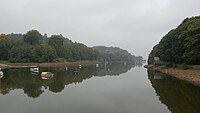Rudyard
| Rudyard | |
| Staffordshire | |
|---|---|
 The west bank of Rudyard Lake | |
| Location | |
| Grid reference: | SJ946581 |
| Location: | 53°7’13"N, 2°4’53"W |
| Data | |
| Postcode: | ST13 |
| Local Government | |
Rudyard is a lakeside village in Staffordshire, sitting just west of Leek at the edge of the Staffordshire Moorlands. On the east side of the village stretches Rudyard Lake, created as a reservoir to serve the Caledon Canal, but best loved as a leisure destination.
Rudyard was formerly served by a railway station which was opened by the North Staffordshire Railway on 22 July 1850. The station was built to bring holidaymakers to the lake, and in its day the village was busy with such visitors. Visitors in the lake's heyday included John Lockwood Kipling and Alice Macdonald, who first met at Rudyard and later married and named their son, the poet Rudyard Kipling, after the village.[1]
Rudyard Lake

- Main article: Rudyard Lake
Rudyard Lake was built in 1797 by the engineer John Rennie, for the Trent and Mersey Canal company, to provide water for the Caldon Canal.
The lakeside resort developed after the construction of the North Staffordshire Railway in 1845. On one particular day in 1877, more than 20,000 people came to watch Captain Webb, the first man to swim the English Channel, swim the reservoir.
The Rudyard Lake Sailing Club is based on the lake.
About the village
The Rudyard Lake Steam Railway operates steam trains along a one and a half mile track along the eastern side of the lake.
The Staffordshire Way, a long distance footpath, runs through the village and along the western shore of the lake.
Outside links
| ("Wikimedia Commons" has material about Rudyard) |
References
- ↑ Drawing by John Lockwood Kipling, and Biography Victoria & Albert Museum.